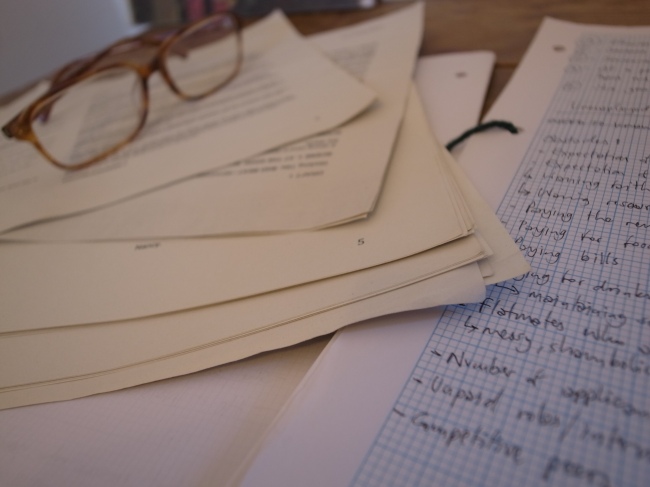The first time John Walton and I met was at his old flat in Covent Garden. He auditioned me for one his first productions as a director, an adaptation of Mishima’s Yoroboshi. I didn’t get the part, but – and actors can take solace from this next bit – he kept me in mind for a future project. Yes, that overused and frequently hollow promise that underlines every rejection letter does sometimes actually come true.
Within a few months we were thrust together again at Gifford’s Circus, touring in their summer production of War and Peace. During the rehearsal process I had my first play produced in London. Chicken premiered at Southwark Playhouse, earning me the nickname ‘Shakespeare’ with our circus director. A moniker I tried endlessly to re-ignite with my peers in London but alas it was not to be. Not least because I wasn’t really a writer yet. My only experience of the writing process had been sitting in my bedroom, living on crisps and banging my head against a wall. That’s how I wrote Chicken.
But that’s not strictly true, the catalyst which converted me from actor to actor-writer came before that, on a collaborative writing project at Action Transport Theatre. Under the guidance of super-mentor and professional playwright Kevin Dyer, myself and three other emerging writers researched and wrote a play which we toured back to the young people who had inspired it.
I found this collaborative writing process completely different to that of writing Chicken. Much of our early work at Action Transport was done in a rehearsal room, either leading workshops with the young people we met or discussing our memories of our own childhoods and our ideas as a writing team. This led into a more traditional solo writing period but it was characterised initially by vocalising ideas rather than the silent solitude of my garret in London.
Working with John on Winston… was in some respects a combination of the two and another equally steep learning curve for me, chiefly because I had never researched my main character before. I had based characters on people close to me, people I had read about in the newspaper and people I had met but never someone that everybody in the world was already well acquainted with.
So the first thing we did was spend a week in a rehearsal room with My Early Life – Churchill’s autobiography covering the period – and enthusing over what was great about the book – the imperial cast list, the numerous trysts with death, our lead character’s insistence on silk underpants. A focus for our story quickly presented itself to us – bookended by an Oldham by-election failure and an Oldham general election success – was an impossible tale of escape and endurance in South Africa.
Every writer I have ever sought advice from has told me that the dialogue always comes last. The majority of your work, particularly in the early stages, will be spent structuring and re-structuring the piece and discovering who your character is. Once you have these two things down, the dialogue will write itself.
John often says that one of the reasons we worked so successfully together on this project was because he has that meticulous, scientist’s eye for construction and I have a natural bent for character and dialogue.
And true to form, the first thing I wanted to do was the fun bit – write the words. My initial interests in the script lay in the tone and getting Churchill’s voice right – an uncommon mixture of Victorian era imperial entitlement and naïve, youthful ambition.
Because that’s the bit you spent your life overhearing at bus stops, scratching down in notebooks and what lingers from a great production – that is what makes you want to be a writer and that is what will engage the audience when the piece is performed. But it’s also the bit that must be deferred.
So we painstakingly beat out a structure, moment by moment and gradually, inadvertently, through studying the facts of the real life story, a character began to emerge. Tiptoeing towards dialogue we experimented by giving him some of Churchill’s actual words to speak. We transposed as much of the young war correspondent’s dispatches into our script as possible and read it aloud.
It was a complete failure. Although Churchill is a great writer – his florid language and imagery so pleasurable and evocative for the reader – when spoken as dialogue, the text falls flat. Heavy, dense and far too wordy, it did not capture the essence of the man at all let alone the energetic spirit of youth captured in the story.
In relying too heavily on the facts of the story we had become too loyal, too reverent to the myth of Churchill. And so I was given the license to start create dialogue and being released from the bonds of verbatim text was hugely liberating.
John suggested we refer to him as Winston rather than Churchill to help alleviate us of the burden of history and in my sketches and early drafts I went one further – I called him Paul. Soon enough, whilst maintaining all of those essential character traits we had compiled and discarding his famous title, all the pomp began to dissipate. He became human for the first time – a young person, like you or I, facing his demons, contesting with his destiny and defining himself for the first time.
And that is the spirit with which we continued – drafting and redrafting, in cafés, in rehearsal rooms, at fringe festivals around the country, fine tuning this thing we had carved from science and art, structure and dialogue, the known and the unknown.
